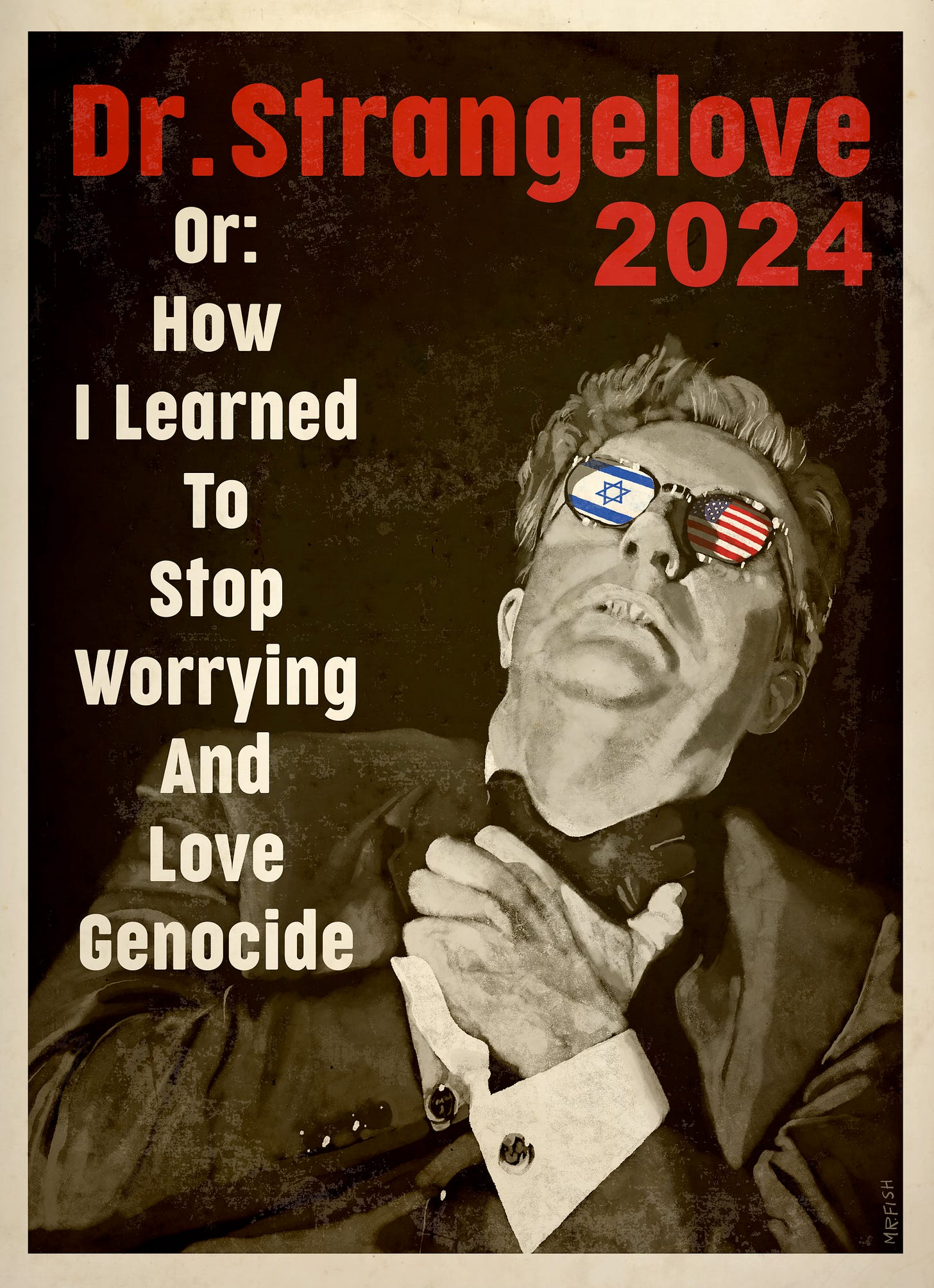Text Originally Published May 08, 2024
Strangelove 2024 — by Mr. Fish
NEW YORK CITY: I am sitting on a fire escape across the street from Columbia University with three organizers of the Columbia University Gaza protest. It is night. New York City Police, stationed inside and outside the gates of the campus, have placed the campus on lockdown. There are barricades blocking streets. No one, unless they live in a residence hall on campus, is allowed to enter. The siege means that students cannot go to class. Students cannot go to the library. Students cannot enter the labs. Students cannot visit the university health services. Students cannot get to studios to practice. Students cannot attend lectures. Students cannot walk across the campus lawns. The university, as during the Covid pandemic, has retreated into the world of screens where students are isolated in their rooms.
The university buildings are largely vacant. The campus pathways deserted. Columbia is a Potemkin university, a playground for corporate administrators. The president of the university — a British-Egyptian baroness who built her career at institutions such as the Bank of England, World Bank and International Monetary Fund — called in police in riot gear, with guns drawn, to clear the school’s encampment, forcibly evict students who occupied a campus hall and beat and arrest over 100 of them. They were arrested for “criminal trespassing” on their own campus.
These administrators demand, like all who manage corporate systems of power, total obedience. Dissent. Freedom of expression. Critical thought. Moral outrage. These have no place in our corporate-indentured universities.
All systems of totalitarianism, including corporate totalitarianism, deform education into vocational training where students are taught what to think, not how to think. Only the skills and expertise demanded by the corporate state are valued. The withering away of the humanities and transformation of major research universities into corporate and Defense Department vocational schools with their outsized emphasis on science, technology, engineering and math, illustrate this shift. The students who disrupt the Potemkin university, who dare to think for themselves, face beatings, suspension, arrest and expulsion.
The mandarins who run Columbia and other universities, corporatists who make salaries in the hundreds of thousands of dollars, oversee academic plantations. They treat their poorly paid adjunct faculty, who often lack health insurance and benefits, like serfs. They slavishly serve the interests of wealthy donors and corporations. They are protected by private security. They despise students, forced into onerous debt peonage for their education, who are non-conformists, who defy their fiefdoms and call out their complicity in genocide.
Columbia University, with an endowment of $13.64 billion, charges students nearly $90,000 a year to attend. But students are not allowed to object when their tax and tuition money funds genocide, or when their tuition payments are used to see them, along with faculty supporters, assaulted and sent to jail. They are, as Joe Biden put it, members of “hate groups.” They are engaged in “lawlessness” as Senate Majority leader Chuck Schumer said of those who occupied Hamilton Hall at Columbia renaming it Hind Hall, in honor of a six-year-old Palestinian girl, Hind Rajab, who was murdered by Israeli forces after spending hours trapped in a car with her six dead relatives.
During the assault by dozens of police on the occupied hall, one student was knocked unconscious, several were beaten and sent to hospital and a shot was fired by a police officer inside the hall. The excess use of force is justified with the lie that there are outside infiltrators and agitators directing the protest. As the protests continue, and they will continue, this use of force will become more draconian.
“The university is a place of capital accumulation,” says Sara Wexler, a doctoral student in philosophy, seated with two other students on the fire escape. “We have billion dollar endowments that are connected to Israel and defense companies. We are being forced to confront the fact that universities aren’t democratic. You have a board of trustees and investors that are actually making the decisions. Even if students have votes saying they want divestment and the faculty want divestment, we actually don’t have any power because they can call in the NYPD.”
There is an iron determination by the ruling institutions, including the media, to shift the narrative away from the genocide in Gaza, to threats against Jewish students and antisemitism. The anger the protesters feel for journalists, especially at news organizations such as CNN and The New York Times, is intense and justified.
“I’m a German-Polish Jew,” says Wexler. “My last name is Wexler. It’s Yiddish for money-maker, money-exchanger. No matter how many times I tell people I’m Jewish, I’m still labeled antisemitic. It’s infuriating. We are told that we need a state that is based on ethnicity in the 21st century and that’s the only way Jewish people can be safe. But it is really for Britain and America and other imperialist states to have a presence in the Middle East. I’ve no idea why people still believe this narrative. It makes no sense to have a place for Jewish people that requires other people to suffer and die.”
I have seen this assault on universities and freedom of expression before. I saw it in Augusto Pinochet’s Chile, the military dictatorship in El Salvador, Guatemala under Rios Montt, and during my coverage of the military regimes in Argentina, Peru, Bolivia, Syria, Iraq and Algeria.
Columbia University, with its locked gates, lines of police cruisers, rows of metal barricades three and four deep, swarms of uniformed police and private security, looks no different. It looks no different because it is no different.
Welcome to our corporate dictatorship.
The cacophony of the streets of New York City punctuates our conversation. These students know what they are risking. They know what they are up against.
Student activists waited months before setting up encampments. They tried repeatedly to have their voices heard and their concerns addressed. But they were rebuffed, ignored and harassed. In November, the students presented a petition to the university calling for divestment from Israeli corporations that facilitate the genocide. No one bothered to respond.
The protesters endure constant abuse. On April 25, during Columbia’s senior boat cruise, Muslim students and those identified as supporting the protests had alcohol poured on their heads and clothes by jeering Zionists. In January, former Israeli soldiers studying at Columbia used skunk spray to assault students on the steps of Lowe Library. The university, under heavy pressure once the attackers were identified, said they had banned the former soldiers from campus, but other students reported seeing one of the men on campus recently. When Jewish students in the encampment attempted to prepare their meals in the kosher kitchen at the Jewish Theological Seminary, they were insulted by Zionists who were in the building. Zionist counter demonstrators have been joined on campus by the founder of the white supremist Proud Boys organization. Students have had their personal information posted on the Canary Mission and found their faces on the sides of trucks circling the campus, denouncing them as antisemites.
These attacks are replicated at other universities, including UCLA, where masked Zionists released rats and tossed fireworks into the encampment and broadcast the sound of crying children – something the Israeli army does to lure Palestinians in Gaza out of hiding to kill them. The Zionist mob, armed with pepper and bear spray, violently attacked the protesters, as police and campus security watched passively and refused to make arrests.
“At the General Studies gala, which is one of the undergraduate schools that has a large population of former IDF soldiers, at least eight students wearing keffiyehs were physically and verbally harassed by students identified as ex-IDF and Israelis,” Cameron Jones, a sophomore majoring in urban studies and who is Jewish, tells me. “Students were called ‘bitch’ and ‘whore’ in Hebrew. Some were called terrorists and told to go back to Gaza. Many of the students harassed were Arabs, some having their keffiyehs ripped off and thrown to the ground. Several students in keffiyehs were grabbed and pushed. A Jewish student wearing a keffiyeh was cursed at in Hebrew and later punched in the face. Another student was kicked. The event ended after dozens of students sang the Israeli national anthem, some of them flipping off students wearing keffiyehs. I have been followed around campus by individuals and been cursed and had obscenities yelled at me.”
The university has refused to reprimand those who disrupted the gala, even though the individuals who carried out the assaults have been identified.
Universities have hired people such as Cas Holloway, currently the chief operating officer at Columbia, who was the deputy mayor for operations under Michael Bloomberg. Holloway reportedly oversaw the police clearance of the Occupy encampment at Zuccotti Park. This is the kind of expertise universities covet.
At Columbia, student organizers, following the mass arrests and evictions from their encampment and Hind Hall, called for university-wide strikes by faculty, staff and students. Columbia has canceled its university wide commencement.
I am on the campus of Princeton University. It is after evening prayers and 17 students who have mounted a hunger strike sit together, many wrapped in blankets.
As universities escalate their crackdowns, the protesters escalate their response. Students at Princeton held rallies and walk-outs throughout October and November, which culminated in a protest at the Council of the Princeton University Community, made up of administrators, students, staff, deans and the president. They were met at each protest with a wall of silence.
Princeton students decided, following the example at Columbia, to set up a tent encampment on April 25 and issued a set of demands calling on the university to “divest and disassociate from Israel.” But when they arrived early in the morning at their staging areas, as well as the site in front of Firestone Library which they hoped to use for an encampment, they were met with dozens of campus police and Princeton town police who had been tipped off. The students hastily occupied another location on campus, McCosh Courtyard. Two students were immediately arrested, evicted from their student housing and banned from campus. The police forced the remaining students to take down their tents.
Protesters at the encampment have been sleeping in the open, including when it rains.
In an irony not lost on the students, dotted around Princeton’s campus are massive tents set up for reunion weekend where alumni down copious amounts of alcohol and dress up in garish outfits with the school colors of orange and black. The protesters are barred from entering them.
Thirteen students at Princeton occupied Clio Hall on April 29. They, like their counterparts at Columbia, were arrested and are now barred from campus. Some 200 students surrounded Clio Hall in solidarity as the occupying students were led away by police. As they were being processed by the police, the arrested students sang the Black spiritual Roll Jordan Roll, altering the words to “Well some say John was a baptist, some say John was a Palestinian, But I say John was a preacher of God and my bible says so too.”
The hunger strikers, who began their liquid-only diet on May 3, issued this statement:
The Princeton Gaza Solidarity Encampment announces the initiation of a hunger strike in solidarity with the millions of Palestinians in Gaza suffering under the ongoing siege by the state of Israel. The Israeli occupation has deliberately blocked access to basic necessities to engineer a dire famine for the two million residents of Gaza. Since the announcement on October 9 by the Israeli Defense Minister prohibiting the entry of food, fuel and electricity into the Gaza Strip, Israel has systematically obstructed and limited access to vital aid for Palestinians in Gaza, even intentionally destroying existing cropland. On March 18, the U.N. Secretary General declared that “This is the highest number of people facing catastrophic hunger ever recorded by the integrated food security classification system.” To make bread, Gazans have been forced to use animal feed as flour. To break their fasts in Ramadan, Gazans have been forced to prepare meals of grass. 97% of Gaza’s water has been deemed undrinkable since October 2021 and they have been forced to drink dirty salt water to survive. The consequences of this unprecedented famine created and maintained by Israel will devastate Gaza’s children for generations to come and cannot be tolerated any longer. We have begun our hunger strike to stand in solidarity with the people of Gaza. We are drawing from the tradition of Palestinian political prisoners going on salt-water-only hunger strikes in Israeli prisons since 1968. Our hunger strike is a response to the administration’s refusal to engage with our demands for disassociation and divestment from Israel. We refuse to be silenced by the university administration’s intimidation and repression tactics. We struggle together in solidarity with the people of Palestine. We commit our bodies to their liberation. Participants in the hunger strikes will abstain from all food or drink except water until the following demands are met:
• Meet with students to discuss demands for disclosure, divestment and a full academic and cultural boycott of Israel.
• Grant complete amnesty from all criminal and disciplinary charges for participants of the peaceful sit-in.
• Reverse all campus bans and evictions of students.
The university and the world must recognize that we refuse to be complicit in genocide and will take every necessary action to change this reality. Our hunger strike, though small in comparison to the enduring suffering of the Palestinian people, symbolizes our unwavering commitment to justice and solidarity.












